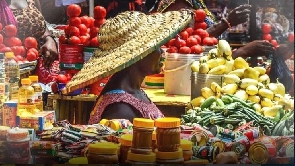 The Fair Food Price Monitor warns how rising prices for Ghanaian consumers are
The Fair Food Price Monitor warns how rising prices for Ghanaian consumers are
A recent consumer research study on food prices has shed light on the alarming issue of unfair food prices in the country.
The study, conducted by a Consumer Advocacy Centre and Consumer International, has revealed that consumers in Ghana are being subjected to unjust pricing practices, potentially leading to financial strain and food insecurity.
A new tool developed by consumer organisations called Fair Food Price Monitor highlighted the risk of unfair food prices in Ghana, driven by insufficient competition in national and global food supply chains.
The Fair Food Price Monitor warns how rising prices for Ghanaian consumers are potentially being caused not only by factors such as increased fuel costs and currency depreciation, but also by dominant market.
The tool uses data from sources such as the UN World Food Programme (WFP) and UN Food and Agriculture Organization (FAO) to track the relationship between food prices at different stages of the supply chain in Ghana, and to highlight where investigation and action may be needed from government.
Growing evidence of unfair prices
Key outcomes from the first analysis using the Fair Food Price Monitor showed that for several important food items, retail and consumer prices have risen substantially faster than wholesale or market prices.
An example is between January 2022 and July 2023 when the retail price of onions increased by 42.4 percent while the wholesale price rose by just 18.1 percent in the same period. The retail price of gari grew by 77 percent, compared to a 63 percent rise in wholesale prices; and an increase of just 46.4 percent in the wholesale price of cassava, gari’s basic ingredient. The retail price of sorghum increased by 117.9 percent, while the wholesale price went up 100.6 percent.
This shows that while costs are increasing for all market actors, consumers are bearing an unfair and excessive burden. The Fair Food Price Monitor explores several potential explanations for this divergence in retail and wholesale prices – such as rising fuel costs and a weakening exchange rate; but finds that while these factors may have contributed, they do not appear to be sufficient explanation for the excessive rise in retail prices.
This revelation has sparked calls for immediate action to address this pressing issue and ensure fair pricing for all Ghanaians.
Consulting President for Laweh University College, Professor Goski Alabi, indicated that regulating cartels within the system that undermine local production is a complex challenge. However, there are several measures that can be taken to enhance business and address the issue. One approach is to introduce consumer protection and competition laws and enforce them to prevent anti-competitive practices.
Additionally, collaborating with local producers and providing support to enhance their competitiveness can also help level the playing field.
Prof. Alabi added: “It is crucial for government agencies, consumer protection organisations and stakeholders to work together to develop effective strategies and policies to regulate cartels and ensure a fair business environment for local production”.
According to the General Secretary of the General Agriculture Workers’ Union (GAWU), Edward Kareweh, there are indeed remedies to this problem but it is crucial to have a strong dedication to implementing the solutions suggested by experts.
The UN Conference on Trade and Development (UNCTAD) noted in its 2023 Trade and Development Report that “in the context of cascading crises, there is a stark contrast between growing risks to the food security of millions and profiteering by corporations”.
This, the Consumer Advocacy Centre says, is crucial for the government and relevant stakeholders to prioritise addressing the shortcomings with utmost urgency.